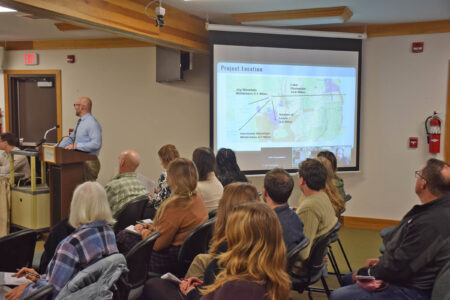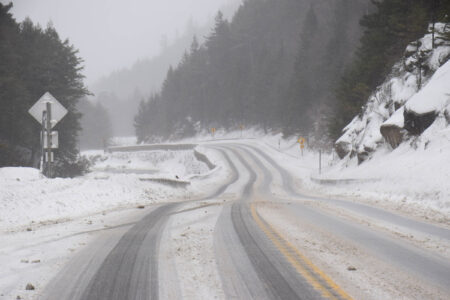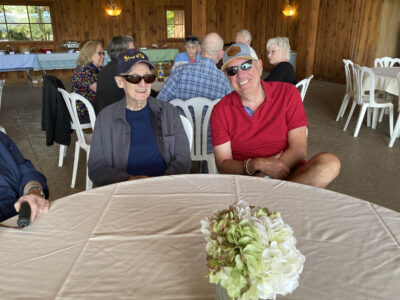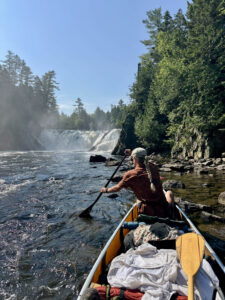Lake Placid stunned by untimely death of bobsled great Steve Holcomb
- Steve Holcomb talks to the press at the Whistler Center following his historic gold-medal victory in the 2010 Vancouver Winter Olympics. His win ended a 62-year gold-medal drought for the United States in Olympic four-man bobsledding. (Enterprise photo — Lou Reuter)
- Steve Holcomb, second from right, holds up his Winter Olympic medals — a gold from 2010 and two bronzes from 2014 — as do, from left, alpine skier Andrew Weibrecht, luger Erin Hamlin and Holcomb’s brakeman Steve Langton at a parade welcoming Olympians home to Lake Placid on March 17, 2014. (Enterprise photo — Matthew Turner)
- Steve Holcomb and Steve Langton launch their bobsled in the Winter Olympics on Feb. 17, 2014, in Krasnaya Polyana, Russia. They won a bronze medal, breaking the U.S.’s 62-year medal drought in two-man bobsledding. (Enterprise photo — Lou Reuter)

Steve Holcomb talks to the press at the Whistler Center following his historic gold-medal victory in the 2010 Vancouver Winter Olympics. His win ended a 62-year gold-medal drought for the United States in Olympic four-man bobsledding. (Enterprise photo — Lou Reuter)
LAKE PLACID — Olympic-gold-medal-winning U.S. bobsled pilot Steven Holcomb died of fluid in his lungs, although his final cause of death awaits a toxicology report.
That was the announcement of Essex County Coroner Frank Whitelaw Sunday evening, leaving some suspense for a village and international Olympic community stunned by the news that Holcomb had been found dead Saturday morning in his room at the Olympic Training Center. Holcomb, 37, grew up in Park City, Utah, but regarded Lake Placid as his second home.
Dr. C. Francis Varga performed the autopsy Sunday afternoon at Adirondack Medical Center in Saranac Lake and made a diagnosis of pulmonary congestion, according to Whitelaw. Pulmonary congestion is defined as excess fluid in the lungs. The toxicology testing will be done at an independent laboratory, Whitelaw wrote in a press release, adding, “A preliminary toxicology study performed at Adirondack Medical Center was negative for drugs. There is no suspicion of foul play.”
John Morgan of Lake Placid, a former bobsledder who has traveled the world as the leading U.S. broadcast commentator for the sport for four decades, said the sport lost its brightest star.
“Devastating, and I hope we get through it,” Morgan said Saturday evening. “I considered him the best bobsledder of the modern era for what he achieved, how he persevered through some tough times, and how he refused to be knocked down. He was just power. He’s from the old school. He could have been a champion from any generation.”

Steve Holcomb, second from right, holds up his Winter Olympic medals — a gold from 2010 and two bronzes from 2014 — as do, from left, alpine skier Andrew Weibrecht, luger Erin Hamlin and Holcomb’s brakeman Steve Langton at a parade welcoming Olympians home to Lake Placid on March 17, 2014. (Enterprise photo — Matthew Turner)
“He’s friendly to anybody,” said Holcomb’s friend Anthony Espinoza, a U.S. luger who lives in Lake Placid. “He could make anybody his best friend if he wanted to. He was never a cocky guy, never had an attitude or a sense of entitlement. He was always very humble, knew his beginnings, knew where he was from, knew his roots. He was a really good guy.”
Village police and the Lake Placid Volunteer Ambulance Service were the first responders to the Olympic Training Center after an emergency call was made at 1:50 p.m. Saturday of an unresponsive person — not a standard call for the OTC, said Sgt. Frank Strack.
“The ambulance (squad) went in and assessed him immediately and were able to determine it was the obvious signs of death,” Strack said Sunday. “So we just assisted state police with the processing of their case, and then we assisted the coroner with the removal.”
Strack declined to describe the scene in detail because state police handled the case, as the OTC is outside village lines. State police issued a brief press release at 9:30 a.m. Monday stating the basics of the case and listing Holcomb’s home as Colorado Springs, Colorado. Calls and messages to OTC officials in Lake Placid and Colorado Springs were not returned as of Sunday evening.
Strack said this is the first time village police responded to an athlete’s death at the OTC in his time on the force, dating back to 2005, and he couldn’t recall a similar incident before then.

Steve Holcomb and Steve Langton launch their bobsled in the Winter Olympics on Feb. 17, 2014, in Krasnaya Polyana, Russia. They won a bronze medal, breaking the U.S.’s 62-year medal drought in two-man bobsledding. (Enterprise photo — Lou Reuter)
Holcomb competed for the U.S. for nearly two decades since his start in 1998. He was a three-time Winter Olympian, winning a gold medal at the 2010 Vancouver games piloting the “Night Train” four-man bobsled. It was Team USA’s first four-man gold medal in 62 years.
At the 2014 Sochi games, Holcomb was part of the two-man and four-man bobsled teams that won bronze medals. The two-man medal broke another 62-year drought for the U.S.
Holcomb was a six-time overall World Cup season champion and won 60 World Cup medals. He also served in the Utah Army National Guard between 1999 and 2006 and took part in the Army World Class Athlete Program.
Morgan, from his broadcast perch, witnessed Holcomb’s entire career, from his start as a push athlete right through his historic triumphs.
“I only missed two of his races,” Morgan continued. “The first time I saw him race was at the ’98 World Championships. He was a brakeman for one of the U.S. sleds — USA 2 or 3, I forget which one — but I told him, ‘You’re wasting your time in the back seat. Get driving.’
“Holcomb driving to that four-man Olympic gold medal, that’s something I never thought I would see in my lifetime,” Morgan added. “He was a special talent. And beyond that, Holcomb was just a great guy. He was a hero in Germany. The Germans loved him — the athletes, the people — everybody loved him. He didn’t have a mean bone in his body.”
“It would be easy to focus on the loss in terms of his Olympic medals and enormous athletic contributions to the organization,” USA Bobsled & Skeleton CEO Darrin Steele said in a statement Saturday, “but USA Bobsled & Skeleton is a family and right now we are trying to come to grips with the loss of our teammate, our brother and our friend.”
The news rippled through Lake Placid Saturday evening and Sunday after the United States Olympic Committee issued a statement confirming Holcomb’s death at 5:02 p.m. Saturday. Numerous athletes from within the Olympic community and from other sports took to social media to express their condolences.
“I’m deeply saddened to have gotten the news about Steve Holcomb,” Lake Placid alpine skiing Olympic silver medalist Andrew Weibrecht wrote on Facebook. “Steve was an incredible competitor and a great guy with a huge heart. Rest In Peace Steve, your presence will be missed throughout the entire community.”
Holcomb and Weibrecht were two of a dozen Olympians who took part in a parade down Main Street in March 2014 welcoming Team USA back to Lake Placid from the Sochi games.
Speaking Sunday morning at the Mirror Lake Inn, the man who helped organize that parade, Weibrecht’s father Ed, said he heard of the news from a friend Saturday afternoon before the USOC’s official release. His wife Lisa then notified their son of the news.
“And he was blown away,” Ed Weibrecht said.
“Andrew had nothing but great things to say about (Holcomb),” Ed Weibrecht continued. “He said he was just an all-around fine person, and everybody we’ve talked to since this has happened only had good things to say about him. It seemed like everybody liked him, and he was very well regarded and respected, and certainly an exceptional athlete.”
For many in the community, the sudden shock of an active Olympian’s unexpected death echoed that of Russian gold-medal figure skater Sergei Grinkov, who suffered a heart attack on the Olympic Center ice in November 1995. Ed Weibrecht was one who shared that sentiment. In 1995, Grinkov and the Stars on Ice group stayed for a month at the Mirror Lake Inn while preparing for the tour.
Varga was the pathologist who performed the autopsy on Grinkov 21 years ago, determining the skater had an enlarged heart due to untreated high blood pressure and nearly complete blockages of two coronary arteries.
The news also hit home hard at the Lake Placid Pub & Brewery, a familiar hangout for sliders and lugers. Espinoza is one of a couple of local sliders who works there. The 23-year-old is also from Park City but befriended Holcomb here in Lake Placid, spending the last Fourth of July with him. He described Holcomb as a “kind-hearted, passionate yet quiet guy.
“But he always had fun,” Espinoza continued. “He was always smiling, always had a joke. It’s just pretty shocking still. You almost still don’t believe it.
“When someone that close to your personal life and your training life as well (dies), someone who is a part of the community at the Olympic Training Center, that’s really big news,” Espinoza added. “So obviously it’s been affecting a lot of different people in a lot of different ways.”
Speaking at work at High Peaks Cyclery Sunday afternoon, former Pub & Brewery bartender Erik Schue said Holcomb was a friend whom he first met several years ago when the “Night Train” crew came in for a post-workout dinner.
“He said to me, ‘I’ve always wanted to bartend,'” Schue recalled of Holcomb. “And I said, ‘I’ve always wanted to wear a gold medal.’ So we traded.”
Jamaican national bobsledder Jazmine Fenlator-Victorian is a former U.S. Olympian who trained and competed alongside Holcomb from 2007 to 2015, including at the 2014 Sochi Olympics. She said she had to do a double-take when her American former teammate Lolo Jones texted and called her with the shocking news.
Fenlator-Victorian then reached out to American bobsledder and 2014 Sochi silver medalist Elana Meyers-Taylor and her husband Nic Taylor, also a former U.S. bobsledder. The couple had seen Holcomb at an NBC Olympics photo shoot 10 days prior.
Fenlator-Victorian described Holcomb as a “quiet teddy bear” who was always willing to give someone a hug or high-five. She also recounted how, despite the pressure Holcomb was under at Sochi to defend his Olympic gold, he took the time to advise Olympic first-timers like her on how to enjoy the moment of the parade of nations.
“He’s a legend in our sport; he paved the way,” Fenlator-Victorian said. “I think skeleton and bobsled and other sports look up to the accomplishments and extremely kind-hearted person he was — extremely humble, (with) such a passion for sport. (We) really feel this loss tremendously.”
—
Senior Sports Writer Lou Reuter interviewed John Morgan for this report.
—
Fellow athletes, associates react to Holcomb’s death







